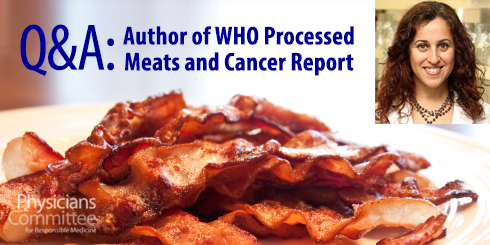Q-and-A: Author of WHO Processed Meats and Cancer Report

Mariana C. Stern, Ph.D., a co-author of the World Health Organization report that declared processed meats carcinogenic to humans, says that physicians should recommend that patients avoid processed meats. In this excerpt from the upcoming summer issue of Good Medicine magazine, Dr. Stern discusses the link between meat and cancer, the impact of the WHO report, and her single most important piece of nutrition advice.
Mariana C. Stern, Ph.D., a co-author of the World Health Organization report that declared processed meats carcinogenic to humans, says that physicians should recommend that patients avoid processed meats. In this excerpt from the upcoming summer issue of Good Medicine magazine, Dr. Stern discusses the link between meat and cancer, the impact of the WHO report, and her single most important piece of nutrition advice.
Dr. Stern will discuss her research on nutrition and cancer at the Physicians Committee’s International Conference on Nutrition in Medicine on July 29-30, 2016, in Washington, D.C. Register to attend at ICNM16.org.
How does meat increase cancer risk?
Several mechanisms have been postulated. One is the presence of heme iron in red meats. This is a component of the protein that transports oxygen in blood. Meats are rich in this protein, as muscle requires a lot of oxygen. In excess, heme iron is known to cause damage in tissues, and can also help in the formation of carcinogens called nitrosamines in the intestines. These nitrosamines can also form in meats that have been treated with nitrates, like bacon or cold cuts, or inside our intestines when diets are high in red meat and there are sources of nitrates. Another mechanism is the formation of a group of carcinogens called heterocyclic aromatic amines that naturally form in red meat when it is cooked at high temperature. Components in the meat can react at high temperature to form these powerful carcinogens.
It is still not clear which of these mechanisms is the most important. There is a chance that different combinations of these may be at play in different people.
Do particular meats increase the risk for particular cancers?
To date, the evidence is strongest for an association between red meats (muscle meat from cows, lambs, pigs, sheep, and horses) and colorectal, pancreas, and prostate cancer. Whereas there is evidence that red meat may also increase risk of other cancers, the evidence is still inconclusive. The evidence is very strong for processed meats and colorectal cancer, and also strong for stomach cancer. Again, there is evidence that processed meats may also increase risk of other cancers, such as breast cancer, but the evidence is still inconclusive.
You were a co-author of the World Health Organization monograph that led to the classification of processed meats as a Group 1 carcinogen. How do you think the report has influenced processed meat consumption?
There is definitively more awareness. I find that many people who had never heard that processed meats might be bad for us now know this and perhaps are starting to make different choices, or at least know that they should not eat processed meats every day. Unfortunately, this knowledge does not cut across our society, as not all people keep up with the scientific knowledge that trickles to the media. In the scientific community, there is more interest on this topic, more validation, which hopefully may translate into more support for new funded studies to understand the role of processed meats on cancer further.
Do you think policy changes should be enacted to protect people from processed meats?
Yes, I think the public should be informed of the known risks of consuming processed meats, so that they can make informed choices. Processed meats are still an affordable staple in many people’s diets, the aisles in supermarkets offering processed foods are very big, and particularly worrisome is the role of processed meats in children’s diets. They make convenient and affordable lunch and snack options. Parents should know the risks associated with processed meats and learn to make alternative choices.
Should physicians recommend that their patients avoid processed meats?
I think so. Diets high in red meat may contribute to heart disease, diabetes, and cancer. Processed meats are now established sources of carcinogens. There are many benefits associated with increasing fruits and vegetables and reducing red meats—and clear benefits from reducing processed meats, given their salt, fat, and carcinogen content. A healthy diet should be part of the conversation between a physician and a patient.
What foods help reduce cancer risk?
Fruits, vegetables, legumes, grains, and nuts. We know diets high in fiber are protective against the development of several cancers, and other diseases as well. We also know of many vitamins and other chemicals present in fruits, vegetables, and nuts that have many beneficial effects reducing inflammation, preventing damage to our DNA, and overall reducing cancer risk.
What is the single most important piece of nutrition advice you wish everyone knew?
Do not trust all information posted online about nutrition and health. Go to the most reputable sources. For knowledge about nutrition and cancer this would include the Physicians Committee, the American Cancer Society, the American Institute of Cancer Research, and the World Health Organization, among others. Epidemiological or experimental studies on diet and cancer are published every day. The press likes them, and they make for great stories, so they appear in the media very quickly. Not all meet the most rigorous scientific standards. And even if they do, the variability across the population is so large that epidemiologists never rely on one single study to make definitive conclusions. We rely on systematic reviews conducted by experts using rigorous methods.
There is the misconception that “everything gives cancer, so why worry about one dietary item or another, they will all cause cancer anyway!” This is not true. To date, there are only a handful of dietary items that have been consistently and solidly linked to cancer. Red meat is one of them, so we should take this seriously. Meat does not need to be the main staple of our diet, and it is not the only source of protein for kids and adults to be strong and healthy. We should give a more prominent role to plant-based foods, which when part of a balanced diet can provide all the essential nutrients we need to grow and stay healthy and strong, and also provide us with many disease- and cancer-fighting nutrients.
In the Western diet, we have grown used to the idea of having meat as the main food item on our plate and everything else on the side. Many people still think that without meat they cannot be healthy. We need to reverse our thinking and make plant-based foods the center of our plate.








